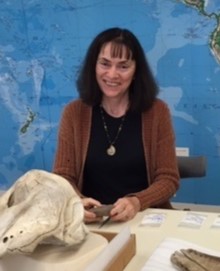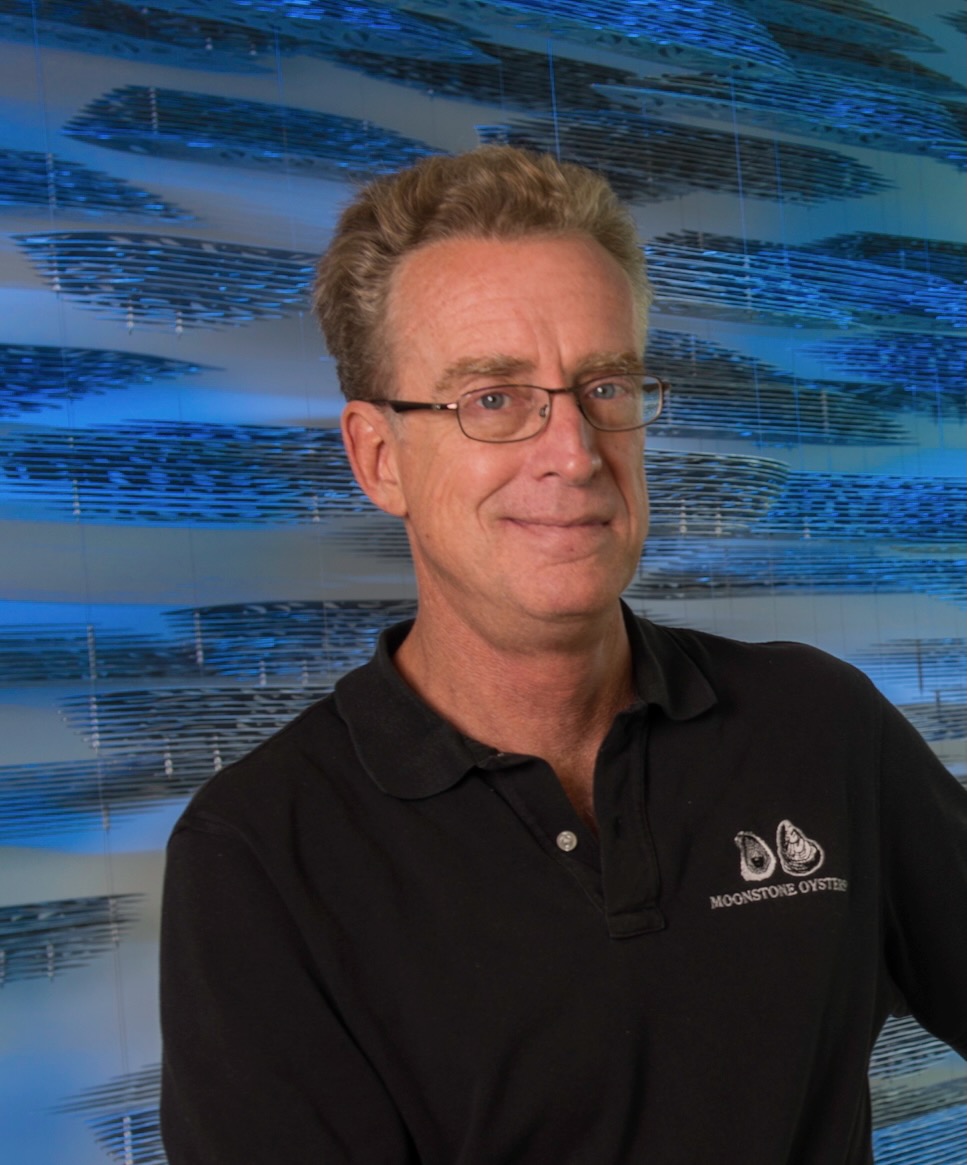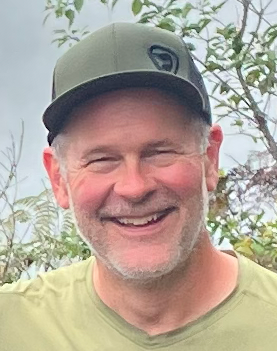Plenary Speakers for the 118th Annual Meeting of the NSA
 Chris Langdon received his Ph.D. degree from the University of Wales, United Kingdom, in 1980 under the mentorship of Drs. Peter Gabbott and Peter Walne. He then took a post-doc position at the University of Delaware before becoming an assistant professor at the Hatfield Marine Science Center (HMSC), Oregon State University, in 1985. His main research focus has been to develop new approaches to improve the long-term sustainability and profitability of molluscan and seaweed aquaculture on the US Pacific Coast by studying the underlying physiological and genetic processes as well as the optimal culture requirements of the cultured species. This has resulted in research on a wide range of topics, including the land-based culture of Pacific dulse and co-culture with red abalone, nutrition of bivalves using encapsulation techniques, breeding and genetics of Pacific oysters under changing ocean conditions, and the use of probiotics to protect oyster larvae against bacterial pathogens. These efforts will contribute to a more resilient shellfish aquaculture industry under future challenging environmental conditions. Chris Langdon received his Ph.D. degree from the University of Wales, United Kingdom, in 1980 under the mentorship of Drs. Peter Gabbott and Peter Walne. He then took a post-doc position at the University of Delaware before becoming an assistant professor at the Hatfield Marine Science Center (HMSC), Oregon State University, in 1985. His main research focus has been to develop new approaches to improve the long-term sustainability and profitability of molluscan and seaweed aquaculture on the US Pacific Coast by studying the underlying physiological and genetic processes as well as the optimal culture requirements of the cultured species. This has resulted in research on a wide range of topics, including the land-based culture of Pacific dulse and co-culture with red abalone, nutrition of bivalves using encapsulation techniques, breeding and genetics of Pacific oysters under changing ocean conditions, and the use of probiotics to protect oyster larvae against bacterial pathogens. These efforts will contribute to a more resilient shellfish aquaculture industry under future challenging environmental conditions.
 Madonna Moss Madonna Moss is Professor Emerita at the University of Oregon. As an anthropological archaeologist, she has studied the long-term history of Native Americans and First Nations of the Northwest Coast of North America, with a focus on Tlingit and Haida and their ancestors. Her book, Northwest Coast: Archaeology as Deep History, re-evaluated new archaeological data on the Northwest Coast within their larger socio-political contexts. With Aubrey Cannon, she co-edited The Archaeology of North Pacific Fisheries, which brought together studies from Alaska, British Columbia, and Puget Sound. Her research concerns how use of animal resources is foundational to the cultural identity and heritage of indigenous groups, and how zooarchaeology can contribute knowledge to improve fisheries and wildlife management, simultaneously supporting Alaska Natives in their contemporary practices. Some of her work with Tlingit community scholars is available in Haa Atxaay aa Kustee Sitee, Our Food is Our Tlingit Way of Life. She has studied the use of shellfish, fish, birds, marine mammals and land mammals, as evidenced archaeologically. Her most recent book (with Thomas Thornton) is Herring and People of the North Pacific: Sustaining a Keystone Species. Moss's contributions have advanced the understanding of human-animal interactions and Indigenous stewardship in the Pacific Northwest, and her work influences both academic scholarship and practical approaches to cultural and environmental preservation.
 Bob Rheault developed an early love of marine life, snorkeling on reefs in Okinawa at age 11, and at age 13 announced to his parents that he wanted to become a shellfish farmer. At 16 he became SCUBA certified and worked at the lobster hatchery on Martha’s Vineyard. In 1987, he started a small shellfish hatchery while working on his PhD. at the University of Rhode Island Graduate School of Oceanography. He trademarked the Moonstone Oysters brand and established a marketing cooperative to distribute locally farmed oysters nationwide. He designed and patented floating upwellers for the nursery culture of oysters, and in 1991 he went to the Philippines, where he was the first to successfully spawn the Asian moon scallop, Amusium pleuronectes. He sold his farm in 2007 and now serves as the Executive Director of the East Coast Shellfish Growers Association. Rheault served on the NOAA Marine Fisheries Advisory Council and the NOAA Science Advisory Board and received the the NSA Wallace Award for the advancement of the shellfish industry in 2005 and the the NAA Joseph P. McCraren Award for outstanding contributions in promoting the growth of aquaculture in 2020. He is a passionate advocate for the shellfish farming community. Bob Rheault developed an early love of marine life, snorkeling on reefs in Okinawa at age 11, and at age 13 announced to his parents that he wanted to become a shellfish farmer. At 16 he became SCUBA certified and worked at the lobster hatchery on Martha’s Vineyard. In 1987, he started a small shellfish hatchery while working on his PhD. at the University of Rhode Island Graduate School of Oceanography. He trademarked the Moonstone Oysters brand and established a marketing cooperative to distribute locally farmed oysters nationwide. He designed and patented floating upwellers for the nursery culture of oysters, and in 1991 he went to the Philippines, where he was the first to successfully spawn the Asian moon scallop, Amusium pleuronectes. He sold his farm in 2007 and now serves as the Executive Director of the East Coast Shellfish Growers Association. Rheault served on the NOAA Marine Fisheries Advisory Council and the NOAA Science Advisory Board and received the the NSA Wallace Award for the advancement of the shellfish industry in 2005 and the the NAA Joseph P. McCraren Award for outstanding contributions in promoting the growth of aquaculture in 2020. He is a passionate advocate for the shellfish farming community.
 Andy Suhrbier is a Senior Biologist at the Washington State based Pacific Shellfish Institute and co-editor of the book, "The World of Sea Cucumbers”. Born in Astoria, Oregon and frequent visitor to the Oregon and Washington coasts and the Salish sea, he loves searching for sea life, eating his first oyster the proper way: raw and on the beach. He was introduced to sea cucumber aquaculture by dive harvester and dual citizen Dr. Vassili Valashnikov many years ago. This influenced him to lead sea cucumber co-culture experiments with oysters, cockles, black cod, and mussels, building on the research of pioneers such as Dr. Leo Zamora (New Zealand) and Dr. Chris Pearce (British Columbia). He is currently studying ways to enhance sea cucumber habitat under shellfish grow-out and finfish nursery sites in Washington State, with hopes to expand to Alaska in the coming years. He also enjoys collaborating with industry, State, USDA, NOAA, and University staff on many crab, clam, geoduck, mussel, and oyster related projects. Andy Suhrbier is a Senior Biologist at the Washington State based Pacific Shellfish Institute and co-editor of the book, "The World of Sea Cucumbers”. Born in Astoria, Oregon and frequent visitor to the Oregon and Washington coasts and the Salish sea, he loves searching for sea life, eating his first oyster the proper way: raw and on the beach. He was introduced to sea cucumber aquaculture by dive harvester and dual citizen Dr. Vassili Valashnikov many years ago. This influenced him to lead sea cucumber co-culture experiments with oysters, cockles, black cod, and mussels, building on the research of pioneers such as Dr. Leo Zamora (New Zealand) and Dr. Chris Pearce (British Columbia). He is currently studying ways to enhance sea cucumber habitat under shellfish grow-out and finfish nursery sites in Washington State, with hopes to expand to Alaska in the coming years. He also enjoys collaborating with industry, State, USDA, NOAA, and University staff on many crab, clam, geoduck, mussel, and oyster related projects.
|
 Madonna Moss is Professor Emerita at the University of Oregon. As an anthropological archaeologist, she has studied the long-term history of Native Americans and First Nations of the Northwest Coast of North America, with a focus on Tlingit and Haida and their ancestors. Her book, Northwest Coast: Archaeology as Deep History, re-evaluated new archaeological data on the Northwest Coast within their larger socio-political contexts. With Aubrey Cannon, she co-edited The Archaeology of North Pacific Fisheries, which brought together studies from Alaska, British Columbia, and Puget Sound. Her research concerns how use of animal resources is foundational to the cultural identity and heritage of indigenous groups, and how zooarchaeology can contribute knowledge to improve fisheries and wildlife management, simultaneously supporting Alaska Natives in their contemporary practices. Some of her work with Tlingit community scholars is available in Haa Atxaay aa Kustee Sitee, Our Food is Our Tlingit Way of Life. She has studied the use of shellfish, fish, birds, marine mammals and land mammals, as evidenced archaeologically. Her most recent book (with Thomas Thornton) is Herring and People of the North Pacific: Sustaining a Keystone Species. Moss's contributions have advanced the understanding of human-animal interactions and Indigenous stewardship in the Pacific Northwest, and her work influences both academic scholarship and practical approaches to cultural and environmental preservation.
Madonna Moss is Professor Emerita at the University of Oregon. As an anthropological archaeologist, she has studied the long-term history of Native Americans and First Nations of the Northwest Coast of North America, with a focus on Tlingit and Haida and their ancestors. Her book, Northwest Coast: Archaeology as Deep History, re-evaluated new archaeological data on the Northwest Coast within their larger socio-political contexts. With Aubrey Cannon, she co-edited The Archaeology of North Pacific Fisheries, which brought together studies from Alaska, British Columbia, and Puget Sound. Her research concerns how use of animal resources is foundational to the cultural identity and heritage of indigenous groups, and how zooarchaeology can contribute knowledge to improve fisheries and wildlife management, simultaneously supporting Alaska Natives in their contemporary practices. Some of her work with Tlingit community scholars is available in Haa Atxaay aa Kustee Sitee, Our Food is Our Tlingit Way of Life. She has studied the use of shellfish, fish, birds, marine mammals and land mammals, as evidenced archaeologically. Her most recent book (with Thomas Thornton) is Herring and People of the North Pacific: Sustaining a Keystone Species. Moss's contributions have advanced the understanding of human-animal interactions and Indigenous stewardship in the Pacific Northwest, and her work influences both academic scholarship and practical approaches to cultural and environmental preservation.

 Bob Rheault
Bob Rheault Andy Suhrbier
Andy Suhrbier